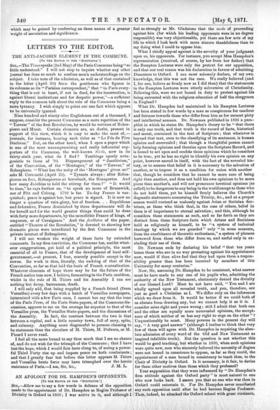LETTERS TO THE EDITOR.
THE ANTI-JACOBIN ELEMENT IN THE COMMUNE. (TO THE EDITOR OF THE " SPEOTATOR.1 SIR,—The Times speaks (2nd May) of the Paris Commune being "so little understood." I will not stop to inquire whether any other journal has done so much to confuse men's understandings on the subject. I take note of the admission, as well as of that contained in the letter (April 30) from the gentleman who figures in its columns as its "Parisian correspondent," that "in Paris every- thing that is not in heart, if not in deed, for the insurrection, is against liberal institutions and for despotic power,"—a sufficient reply to the common talk about the rule of the Commune being a mere tyranny. I wish simply to point out one fact which appears to be universally ignored.
Nine hundred and ninety-nine Englishmen out of a thousand, I suppose, consider the present Commune as a mere repetition of the " Terreur" of the first Revolution, by would-be revivers of Robes- pierre and Marat. Certain elements are, no doubt, present in support of this view, which it is easy to make the most of, — journals, for instance, bearing such titles as "La File du Pere Duchene." But, on the other hand, when I open a paper which is one of the most uncompromising and really influential sup- porters of the Commune, the well-known Siècle, now in its thirty-sixth year, what do I find ? Teachings openly anta- gonistic to those of '94. Disparagement of " Jacobinism," of the Convention, of the "Montague." of the " Terreur," of Robespierre. "What has the unity of the ' Montagne ' given us?" asks M. Cernuschi (April 25). "Tyrants always ; after Robes- pierres on foot, Robespierres on horseback, the Bonapartes. And how many Jacobins to hold the stirrup for them ?" "It would be time," he says further on, "to speak no more of Brunswick, nor of Pitt and Coburg. 1792 is far. To-day France is van- quished; peace is against her, but peace is signed. It is now no longer a question of vain-glory, but of freedom. . . Republican and federative, France diminished by three departments will do for herself and for the world greater things than could be done with forty more departments, by the monolithic France of kings, of emperors, or of Cavaignacs." And the feuilleion of the paper, entitled "Theatre of the Revolution," is devoted to showing how dramatic pieces were interdicted by the first Commune in the private interest of Robespierre.
I will not weaken the weight of these facts by extended comments. In my firm conviction, the Commune has, amidst what- ever exaggerations, got hold of a political principle, the most essential of all to France, that of the development of local self - government,—at present, I fear, scarcely possible except in the towns. Its work is thus, literally, the undoing of that of the Convention, so far as that laid the basis of French centralization. Whatever elements of hope there may be for the future of the French nation toss now, I believe, fermenting in the Paris cauldron, whilst in the rule of M. Thiers and his Assembly I can see nothing but decay, barrenness, death.
I will only add, that being supplied by a French friend (from Versailles) every few days with a batch of Versailles newspapers, intermixed with a few Paris ones, I cannot but say that the tone of the Paris Press, of the Paris State-papers, of the Commune dis- cussions, appears to me on the average far superior to that of the Versailles press, the Versailles State-papers, and the discussions of the Assembly. In fact, the contrast between the two is that between a capital, and a little country town, full of envy, spite, and calumny. Anything more disgraceful to persons claiming to be statesmen than the circulars of M. Thiers, M. Dufaure, or M. Picard I never read.
I feel all the more bound to say thus much that I see no chance of, and do not wish for the triumph of the Commune ; that I have lost the hope, which I would fain have clung to, of seeing a power- ful Third Party rise up and impose peace on both combatants ; and that I greatly fear lest before this letter appears M. Thiera and Versailles brute force may have triumphed over the heroic
resistance of Paris.—I am, Sir, &c., J. M. L.
































 Previous page
Previous page